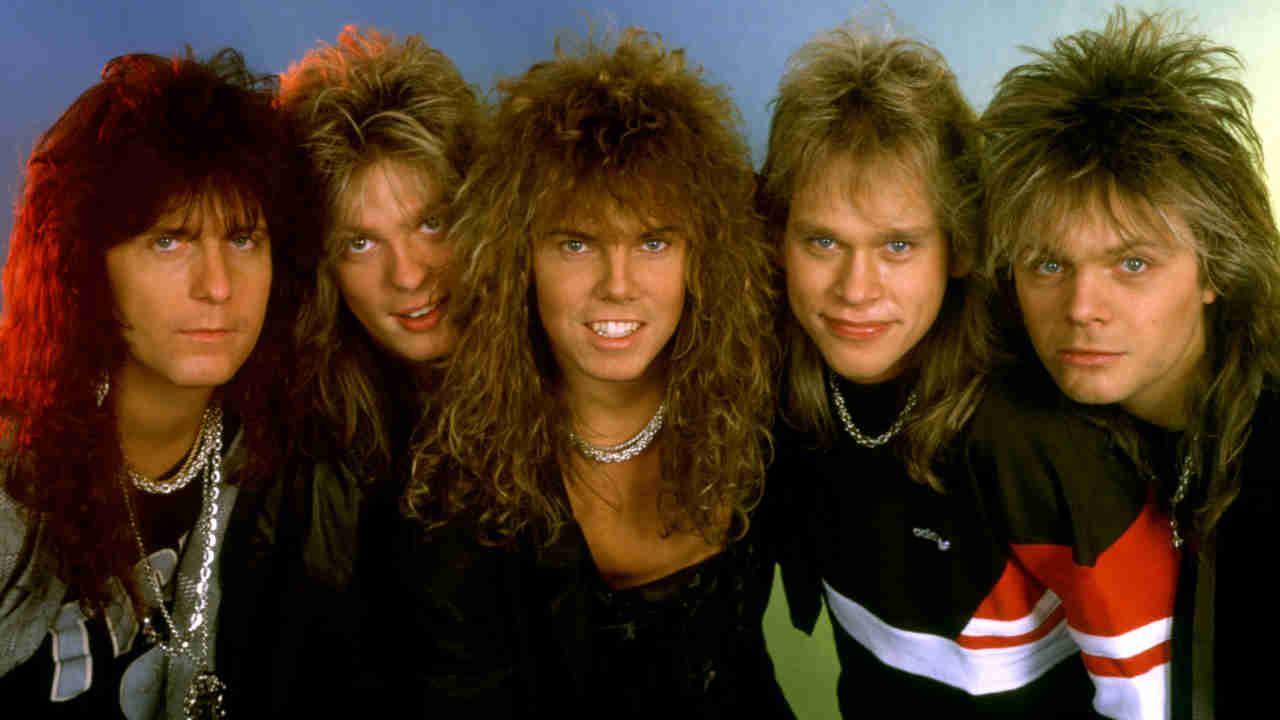
Europe will forever be associated with their1986 megahit The Final Countdown and poodle perms, but as the Swedish rockers pointed out when Classic Rock spoke to the members of the band shortly after their 2003 reunion, they could go toe-to-toe with the likes of Def Leppard and Guns N’ Roses musically… and when it came to partying.

It’s February 1987, and the popularity of Europe is at an all-time high. Basking in the warm glow of the success of their massive global hit The Final Countdown, the Swedish five-piece are on their first ever UK tour, which includes a show at London’s Hammersmith Odeon, where that song accompanies singer Joey Tempest’s grand entrance at the beginning of the soldout show and is also the last of three encores.
Given the attention that the hit single has brought them, Europe are keen to emphasise their credentials as a rock band. Clad from neck to toe in black leather, and with a luxuriantly towering bouffant, the microphone-thrusting Tempest leads the band through a selection of candy-coated yet surprisingly sturdy pop-rock numbers. Guitarist Kee Marcello, new to the line-up, plays an interpretation of Rimskij-Korsakov’s skittish The Flight Of The Bumble Bee, after which the instrumentalists jam on a thinly veiled parody of Deep Purple’s Lazy. Further into the show, a roadie holding a telephone wanders on stage from the side and hands it to the ‘bemused’ singer.
“Yes, yes. Hello,” Tempest flounces theatrically.
The audience hears a disembodied female voice enquiring: “Is this the rock band Europe?” It’s schoolmistress-like, and suspiciously Scandinavian.
Tempest is ‘confused’: “What? Yes, yes,” he huffs.
“Are you the ones making such dreadful noise?” the caller demands. “I live nearby, and it’s quite impossible to sleep. If you don’t stop immediately, I’ll be forced to call the police.”
Grinning, Tempest returns the phone to the roadie, shrugs indifferently and announces to the audience: “We have to stop.” There’s a mixture of boos and pleading girlie screams, until he shrilly delivers the punch line: “…Or do you want to Rock The Night?!”
That pantomime piece of stagecraft is a typical example of why Europe were at times immensely popular but never got to grips with the concept of being cool. They’ve been mocked for making some of the cheesiest videos of all time (such as Tempest singing into a ketchup bottle for Rock The Night); vilified for their extravagantly coiffured hairstyles and Colgate smiles; they have even been dismissed as a corporate, Eurovision-style outfit pieced together by their record company. Those who tried in vain to redress the balance – including a British writer who daftly declared that Europe were “louder than Motörhead, Anthrax or AC/DC” – were laughed at with equal derision as the band themselves.
Europe’s answer was to continue making records, in the hope that operating within the inevitable diminishing commercial returns post-Countdown might bring them respect as artists. But it didn’t quite work out that way. And the biggest irony was that as Europe’s stardom levelled out and then dipped, the quality of their music improved.
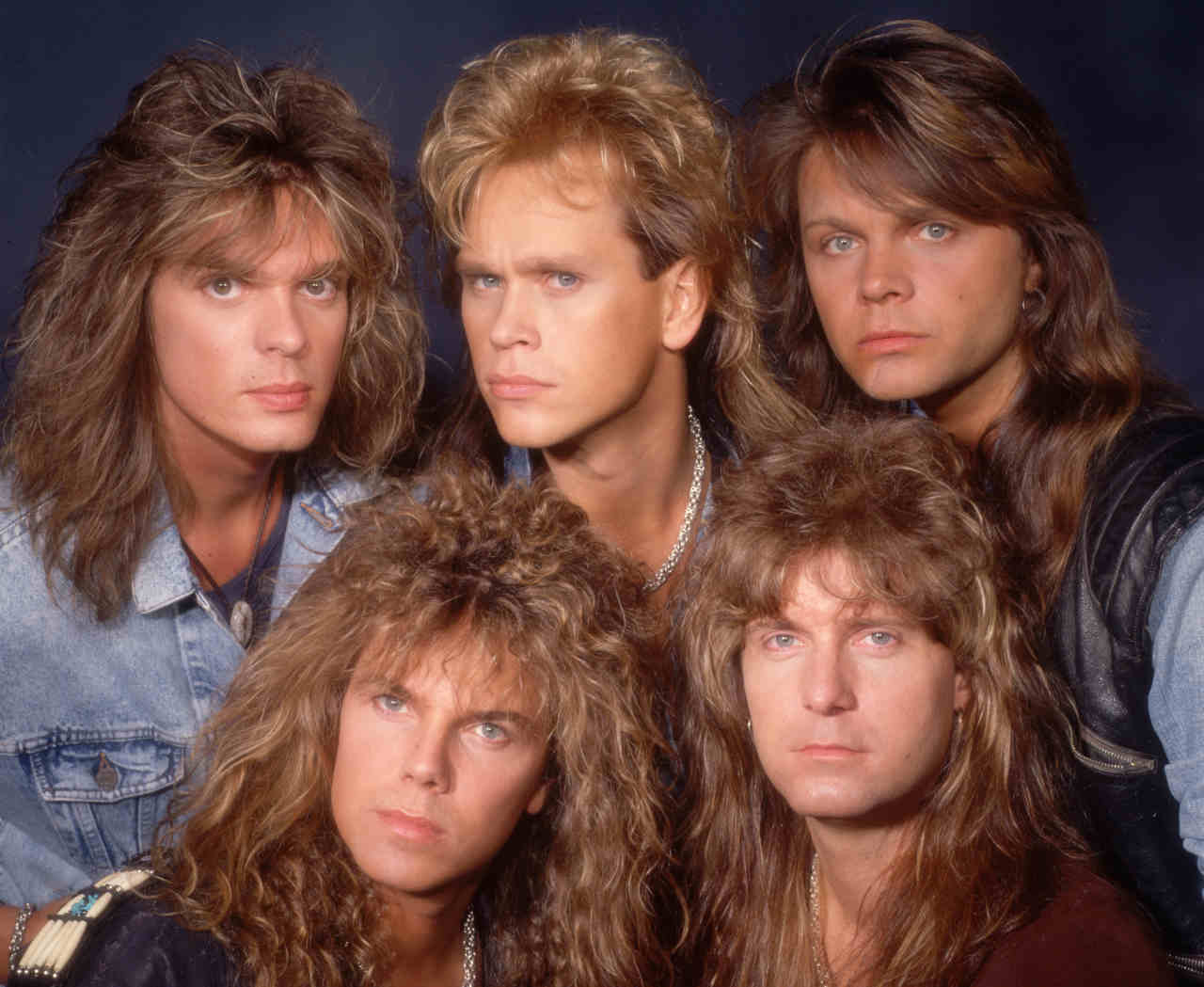
The story of Europe began in 1979, when guitarist John Norum, vocalist Rolf Joakim Larsson, bassist Peter Olsson and drummer Tony Reno formed the band Force. Larsson, aged just 15, had joined them from another Stockholm group called Roxanne, and already had the stage name Joey Tempest. Having attended each other’s gigs and noted each other’s reputation, Tempest and Norum decided to pool their talents.
“John was the coolest guitar player around,” Tempest recalls. “He knew that I was a singer and that I wrote songs, which didn’t really interest him so much at the time.”
“I’d seen Joey playing the bass and singing some covers,” Norum says. “His voice was great, and he had a cool personality on stage. It made sense for us to jam and see what might come of it.”
The first Force rehearsal was really just playing UFO covers, but even at that early stage Tempest felt that the band had potential. He introduced songs of his own songs, and gradually the band began to find a direction.
“Quite soon we met some record company people that seemed to like what we did,” the singer recalls, “but they said we had to cut our hair and stop singing in English. We told them to fuck off.”
The members of Force regularly hung out at Stockholm’s Ice Stadium, learning how it was done by watching concerts there by big names such as Thin Lizzy, Deep Purple, Rainbow, Scorpions and Whitesnake. The arrival in the Europe line-up of bassist John Levén was another important early factor.
“Peter Olsson had played a big part in putting Force together,” Levén explains of joining the band. “The trouble was that he wasn’t a great musician. Force had become really popular, even though they had a bassist that couldn’t play.”
According to Norum, the new-look Force soon got a reputation as the hardest-working yet most fun-loving musicians in the northern suburb of Upplands Väsby. They’d practise for 10 hours straight, then hit the bars at night.
“We wanted to be rock stars so much that we spoke to each other in English at rehearsals,” Levén says.
Turning pro and surviving on almost no money, they played local schools and small festivals, honing their skills and musical direction for a further three years. Tempest’s girlfriend secretly submitted their demo to the organisers of a national talent contest. Later they received a letter inviting them to take part. The first prize was something that at that time seemed way out of the band’s reach and a world away: a record contract. Before the contest, at Tempest’s suggestion, Force adopted the new name Europe.
Regional eliminators, various other rounds and the final (televised live across Sweden) later, Europe were shocked to find that they had beaten 3,999 other hopeful bands to come first and lift the main prize. Not only that, but Tempest also grabbed the prize for the competition’s best singer, and Norum was voted most skilled guitarist.
“We were the only long-haired rock band, so you could say that we stood out,” Tempest recalls of the final. “It also helped that a very loud crowd of fans from Upplands Väsby travelled across the country to support us. And we were a good band,” he insists.
However, Thomas Erdtman, the competition organiser and owner of Hot Records, apparently didn’t share their joy. According to Tempest, Erdtman shook his head and groaned: “What am I gonna do with a hard rock band?”
In 1983 Europe recorded their self-titled debut album as a fourpiece over just two weekends, with Tempest doubling up on keyboards. Co-produced by Erdtman – who quickly overcame his initial aversion to his protégés and took up their management – the record is an ebullient, rough-and-ready collection that barely attempts to conceal its influences. The record blasted into the Sweden Top 10.
Whereas Norum argues that the album “sounds pretty soupy, with way too much reverb,” one Scandinavian critic placed himself at the front of a very long queue when he accused Europe of sounding too professional. All such complaints aside, In The Future To Come, Seven Doors Hotel and The King Will Return all became regulars in their band’s live set. Seven Doors Hotel also gave them an unexpected hit in Japan.
Although they were licensed to CBS subsidiary Epic for the follow-up album, the group kept a tight grip on the purse strings. They recorded working late shifts and at weekends at Stockholm’s Polar Studios, the Abba-owned facility where Led Zeppelin had recorded In Through The Out Door, and hired Leif Mases, the engineer who had worked on those sessions.
Released in 1984, Wings Of Tomorrow was far more consistent than their debut. Tempest’s voice was finally living up to its potential, and Norum’s guitar playing was stellar. Wings… also included contributions from Mic Michaeli, although the keyboard player didn’t officially join Europe until they hit the road, by which time drummer Ian Haugland had succeeded Reno.
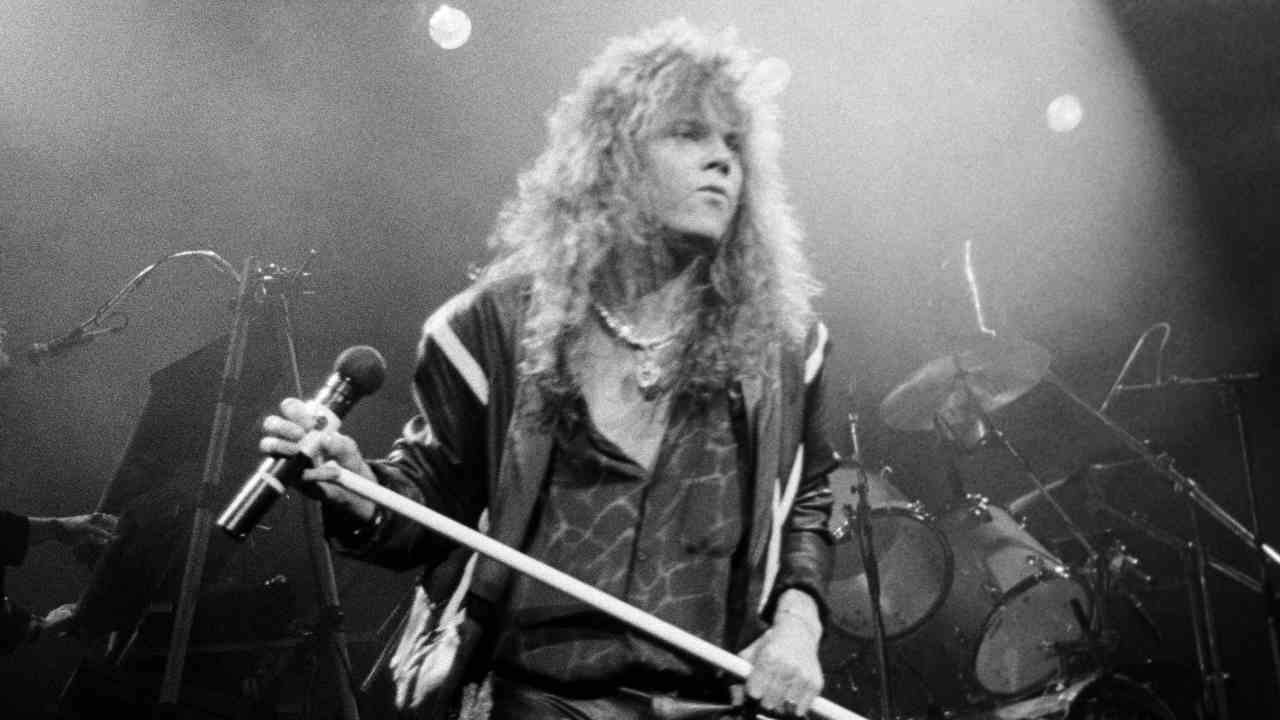
Back in 1986, the amount of hairspray in the atmosphere was causing untold damage to the ozone layer. Bon Jovi had put a disappointing second album, 7800° Fahrenheit, behind them with the release of their next one, the remarkable Slippery When Wet, and were about to be drenched in success. And although Def Leppard were still laboriously piecing together what would become their rocket ship to the stratosphere, Hysteria, the impetus the Sheffield band had enjoyed in the US with ‘Pyromania’ kept the name alive. There was a strange electricity in the air, and a rumble underfoot.
“You could feel that something was about to happen,” Tempest insists in retrospect. “Back then, radio had been afraid to touch hard rock, but that all changed when they heard Photograph [by Def Leppard] or Livin' On A Prayer [Bon Jovi]. We were ready to be part of that.”
Europe were now signed directly to Epic, and Tempest already had the framework of their signature song. Back in the days of Force, he had heard a keyboard motif in a nightclub, and he had never forgotten it.
“It was played as part of a laser show,” he explains of the motif that would later turn his and his band’s world upside down. “We were in there getting drunk, and it made an impact upon me. I started wondering how we could use something like that in our own music.”
Tempest got as far as demoing the song he had written based on it, but then shelved it, until he later had the idea of using it to begin the band’s shows.
“The lyrics were partially inspired by David Bowie’s Space Oddity,” he says of The Final Countdown. “We used to play the tape in the car. But it was six and a half minutes long. And some of the guys in the band thought it was too different for a rock band. But in the end I fought hard to make sure it got used.”
Keyboard player Mic Michaeli was among those who favoured Rock The Night as the first single from the album. But Journey producer Kevin Elson, who oversaw the …Countdown album sessions, firmly sided with Tempest and his resurrected song.
The band shot an impressive promo video for The Final Countdown – now pared back to five minutes – at an ice hockey stadium, and soon after the single’s release towards the end of ’86 its measured, pompously commercial strains (nowadays its synth hook is recognised in an instant) began to take up residence in music charts around the globe, selling millions.
“I recall receiving a phone call to say it was doing well in Holland while I was producing John’s sister [Tone Norum]”, Tempest says.“From there it was like wildfire.”
Soon some eight million copies of The Final Countdown single were sold worldwide. The song topped the chart in 18 countries, including the UK, and became the biggest hit in the history of CBS Records. The album of the same name sold some six and a half million copies, almost half of those in the US alone.
Perhaps sensing the imminent enormity of the band and all that would come with that, Norum quit Europe on the eve of the album’s release.
“He was always an underground guy,” Tempest shrugs regretfully. “On all these TV shows, you had to mime your song. The rest of us slowly adapted to that, but John preferred to sit in the chair and play guitar by himself. Plus, we weren’t communicating too well any more.”
Norum now says his departure was due to musical differences and a disagreement with manager Thomas Erdtman.
“I could see what was happening there, possibly before any of the others,” Norum says. “But I also hated the whole image – those hairstyles made us look like poodles. We were on the covers of all these horrible teenybopper magazines, like David Cassidy – only worse. When I first heard the synth intro to The Final Countdown, my reaction was: ‘No, this is nuts. We just can’t use this.’ Thank God they didn’t listen to me. I still like all the songs on the album, I just couldn’t stand the way it was mixed; the keyboards completely buried the rhythm guitar.”
Today Norum insists that he experienced only sporadic bouts of regret at his decision to leave. “Although I was very young at the time, it was making me so miserable. I had songs that I wanted to record, and it kept being that there was no space. Joey and the manager were the bosses. It had turned into two camps: those guys on one side, bossing everyone around, and the band were on the other.
“I wasn’t taking care of myself, either,” the guitarist continues. “I’d been partying for five years straight, pretty much every day. You don’t always make the right decision when you wake up with a hangover. On a couple of occasions I realised I’d been out of my mind to quit such a huge band. But I’m thankful that I left. I made a solo album [Total Control in ’87], then moved to America and joined Dokken for an album [’99’s Erase The Slate] and tour. None of that would’ve happened if I’d stayed.”
There were other, if less dissenting voices from within. “The record company treated us as a pop act,” John Levén observes. “The success of our song Carrie in America then made us a ballad band; it really drained our morale.”
A few years later, Tempest admitted to mixed feelings concerning The Final Countdown. He figured that on any given night, upwards of 25 per cent of each audience would be there to hear just the single, some almost seeming to suffer the rest of the set in silence. But that didn’t prevent him from attempting to conjure up a sequel for Europe’s fourth album, 1988’s Out Of This World.
“I did try to come up with something similar, but realised the original was just too good,” he admits. “We’d just have ended up a parody of ourselves.”
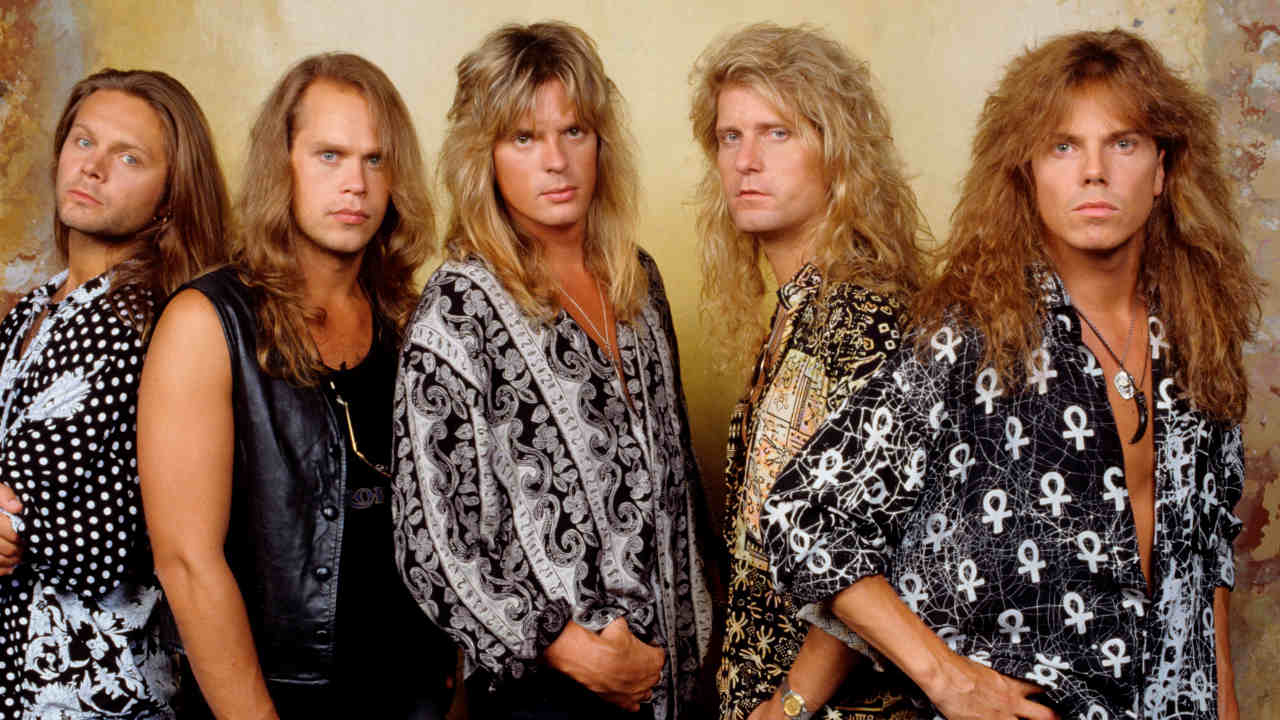
Having written the bulk of Out Of This World while on tour, Europe returned to new homes in Denmark, then flew to the Caribbean tax-haven hideaway of Turks & Caicos. The latter wasn’t quite the paradise it sounds, as security became a major issue and there were long bouts of inactivity and boredom.
The band eventually headed for London, where throughout June 1988 they worked at Olympic Studios with Ron Nevison, a disciplinarian engineer/producer who had previously worked with such giants as Led Zeppelin, Bad Company and The Who.
“We wanted Ron because he’d done the classic UFO albums Lights Out and Obsession, and the early Michael Schenker Group stuff,” Tempest says.
There were some moments of tension with Nevison, although the producer brought out the best in Kee Marcello, whose guitar style was a little more fluid than Norum’s.
“Kee definitely played some good stuff,” Tempest agrees. “I had the song Superstitious quite early on, which gave us something decent to build on. We also re-did Open Your Heart [from Wings Of Tomorrow], but people seemed to like the old version best. Being at Olympic, where The Rolling Stones used to work, was fantastic.”
The new album was a concerted reminder that Europe were a rock band. Despite that, what little respect came their way from the UK press was liberally cloaked in sarcasm. Regardless of such reviews, the album still sold two million copies. In the US, Europe opened for Def Leppard on their Hysteria tour and got the approval they really craved – from their peers.
“Ask Joe Elliott [Leppard singer] about partying with us,” Tempest smiles. “He said we were the wildest band they’d ever toured with. Although they were No.1 with Pour Some Sugar On Me, they were very kind to us, and let us play our full show.”
In early 1989, Europe headlined Rome’s 15,000-seater Palaeur as part of a 54-date European tour. The lobby of their hotel was still rammed with teenaged girls, and Tempest was beginning to see red.
“To a certain extent, it’s okay to be appreciated for your looks,” he huffed. “But it’s more satisfying to gaze into the crowd and see people liking your music. That’s what I’m in this for.”
He was also losing patience with Europe’s continued portrayal as wholesome pretty boys. “We’re no angels,” he says grumpily. “You wouldn’t survive on the road without some fun now and again. This clean-living thing – no sex, no drugs, but lots of rock’n’roll – came from the …Countdown hit. We went along with it at the time, but now I wish we hadn’t.
“The whole pin-up thing was sometimes very frustrating; we knew we were shit-hot at our instruments. If we didn’t look the way we do, we’d still be here today, because it’s not only about looks, it’s about playing.”
For their next album Europe turned to the producer of the moment, Beau Hill. A former musician with the band Airborn, Hill had overseen huge-selling albums from Ratt, Winger, Warrant and Alice Cooper, among others. The result was 1991’s Prisoners In Paradise. The Queen-flavoured title track was a revelation, and songs like Halfway To Heaven, Seventh Sign, Got Your Mind In The Gutter and Little Bit Of Loving achieved the right balance between hook-filled accessibility and the raunch factor the group craved. The album sold a very respectable million copies.
But despite many fans acclaiming it as Europe’s best record the group themselves are strangely lukewarm about it. Tempest says it was “too American. Which is kinda strange for a band called Europe”. Michaeli says they listening too much to the record company and “scrapped a few songs that should’ve been included”. He also reckons some of the band “were succumbing too much to the Los Angeles lifestyle”.
Ian Haugland still winces at the recollection of the listening party at which the group played Epic the finished record. “We were so proud,” he says. “But they gave the usual bullshit about not hearing a single, and said Joey had to write another half a dozen songs with Jim Vallance [Bryan Adams’s then writing partner]. It was a mindfuck.”
On the ensuing world tour, Europe put on a pretty convincing public face. “We were tired, and grunge was knocking on the door,” Tempest now reflects. “One of the last things to happened to us before we went on hiatus was at the Budokan [in Tokyo]. Guns N’ Roses played two nights, so did we. They came to see us and we went to see them. We partied together. We put on a big hard rock show, with entertainment our usual priority. Those guys didn’t even have a set-list, and they played so garage-like, it was obvious that a change was in the air.
“We’d moved abroad, toured and partied for so many years,” he continues. “It was time for a break, although nobody knew it’d last as long as it did. Musically, I just wanted to do something completely different. Not everyone agreed.”
“I remember things differently,” says bassist John Levén. “The only person who wanted to stop was Joey. He brought up the subject of a break, but it seemed like a good idea. We had tax problems in Sweden and a lot of bad press. We were fed up with the financial side of the music business.”
Tempest went on to record three diverse solo albums (A Place To Call Home, Azalea Place and Joey Tempest), and while doing so says he “learned about Neil Young, Jackson Browne and Van Morrison”. Haugland became a radio DJ in Stockholm. Michaeli produced some Scandinavian bands and went on to work for a music DVD company. Michaeli, Haugland and Levén also all recorded and toured with Glenn Hughes, in the mid-90s.
Meanwhile, Norum had learned that life as a solo artist wasn’t all he’d hoped – he’d released a string of albums under his own name throughout the 1990s which failed to set the world on fire. More than one stint with Dokken – both the band and with Don Dokken’s solo outfit - had been equally unfruitful. Then in 2003 he heard via Ian Haugland that a Europe band meeting had been called. Three years previously, a two-guitar line-up featuring both Norum and Kee Marcello had reunited for a Millennium Eve date in Stockholm, playing The Final Countdown and Rock The Night.
“The chemistry was still there,” Haugland enthuses. “It took only five minutes for me to deliver my first fart, and just as long for everyone to tell John Norum to turn down. It was a time-warp.”
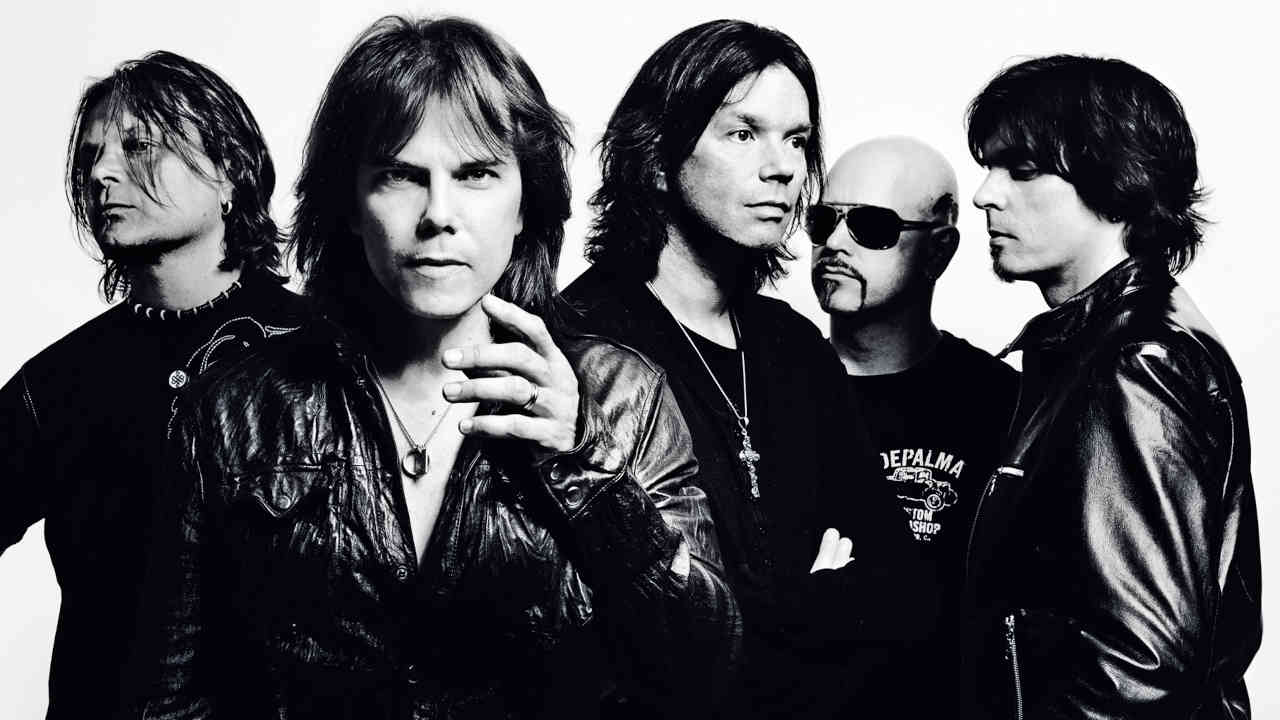
Three years later, Norum had a dilemma. Phil Mogg had asked him to replace Michael Schenkler (“Who had left for the hundredth time,” says the Swede drily). Norum stressed to the other members of Europe that if he was to consider a return to Europe he had to be the sole guitarist: “I was cool with Kee doing some shows, but I said from the beginning that if there was gonna be a studio album I had to do it on my own.”
“When I spoke again to Phil Mogg, the UFO guys understood that Europe’s my family. Their manager [Peter Knorn] did say: ‘Can’t you do both?’ But I’m not on anabolic steroids.”
Marcello wasn’t exactly gutted by his exclusion, because it freed him up for his K2 project. Plus, as he told Classic Rock in August 2004: “I’d be very happy if I never had to play the ‘F’ song [The Final Countdown, of course] again.”
Michaeli also had to be sweet-talked back: “Too many question marks had been left,” he explains. “Who would play guitar? Which direction would we go in? There had to be a solid plan.”
Agreements, compromises, cajoling… however it was done, Europe got back together and got it together. The resulting new album Start From The Dark, is a brave attempt to advance Europe’s sound into the present, and Tempest offers no apologies for its largely modern-rock format.
“We worked again with Kevin Elson, who produced The Final Countdown, but didn’t want to return to that sound,” he says. “Kevin felt the same. I’d been listening to Audioslave, and had just heard about The Darkness, who are great fun. The entire band agreed that we had to make a guitar-based album, the keyboards strengthening rather than playing a major role.”
“The keyboard sounds that Mic uses are dark,” Norum adds. “He didn’t want to go back to the 80s. Why should he? To have remade The Final Countdown would be the dumbest thing possible.”
For all that, the band have a realistic relationship with the song that made them superstars after all this time. “The place still goes mad when we play it,” says Tempest of The Final Countdown. “And that makes me realise that I wouldn’t want to live without it. Even John enjoys playing that song now, because it’s heavier. We’ve come full circle. Friendship-wise, we’re stronger than ever. This is a much better band; it grooves and it has more experience.”
Originally published in Classic Rock issue 75







